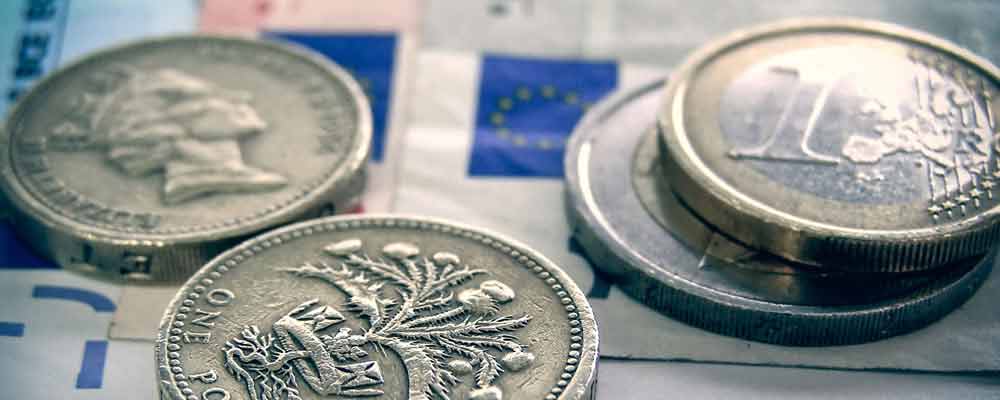GBP/EUR Exchange Rate Heads Higher as the Outlook for the Eurozone’s Economy Darkens
The Pound to Euro (GBP/EUR) exchange rate rose by 0.3% today, with the pairing currently trading around $1.108.
The Euro (EUR) suffered today after the latest Eurozone Construction PMI for December fell below forecasts to 45.5.
With the Eurozone’s construction sector declining for the tenth month, EUR investors are concerned about the bloc’s economic recovery going into 2021.
Usamah Bhatti, an economist at IHS Markit, commented:
‘Concerns surrounding the longer-term impact that the pandemic will have on the wider construction sector, alongside a lack of new projects in both the public and private sector being bought to tender resulted in an extension to the pessimistic outlook held by eurozone-based builders for a fifth month in a row.’
Today also saw the release of the Eurozone’s final Retail Sales data for November, which undershot forecasts and fell to -2.9% year-on-year.
Added to this EUR investors are pessimistic about the Eurozone’s economy as the bloc has struggled with rising Covid-19 cases throughout the first week of January.
Peter Vanden Houte, an analyst at ING, was cautiously optimistic, however, saying:
‘2021 is starting on the wrong foot, with the eurozone economy still struggling. But even though the vaccination process will be drawn-out, we believe that from the second quarter and beyond, some of the excess savings households built up in 2020 will be unleashed, boosting consumption. And that especially goes if the tourism and entertainment sectors are gradually reopened in the European spring.’
Pound (GBP) Heads Higher as UK Construction Enjoys Rebound in 2020
The Pound (GBP) rose against the Euro (EUR) after the UK’s Construction PMI enjoyed a rebound at the end of 2020.
December’s Markit Construction PMI rose to 54.6, although this was slightly below forecasts of 55.
Tim Moore, Economics Director at IHS Markit, commented on the data:
‘A sustained improvement in construction order books resulted in a rise in employment numbers for the first time in nearly two years and the most optimistic growth expectations since April 2017. Construction companies are hopeful that higher demand will broaden out beyond residential projects in the next 12 months, led by infrastructure spending and a potential rebound in new commercial work from the depressed levels seen during the pandemic.’
UK markets are also becoming more hopeful that the Oxford/AstraZeneca Covid-19 vaccine rollout could improve the outlook for Britain’s economy in a few months.
Today also saw new that UK pharmacies are now able to rollout the coronavirus vaccine. The Government continues to push to immunise 13 million vulnerable people by mid-February.
A spokesperson for the NHS said:
‘Pharmacies are already working with GPs to deliver the vaccine in many areas of the country. As more supply becomes available, community pharmacists able to administer large numbers of vaccine will play a role in the NHS’s phased vaccination programme, the biggest in the health service’s history.’
GBP/EUR Forecast: Could Fears of an Extended UK National Lockdown Drag Down Sterling?
Euro (EUR) investors will be awaiting tomorrow’s release of the German Industrial Production data for November.
If this shows an improvement in Germany’s industrial and manufacturing sector, we could see the EUR/GBP exchange rate head higher.
Tomorrow will also see the release of the French Trade Balance data for November.
Any signs of improvement in the French economy would be EUR-positive.
The GBP/EUR exchange rate will continue to be driven by the UK’s coronavirus developments.
If it looks increasingly likely that the UK’s nationwide lockdown could extend beyond February, we will see Sterling suffer.



